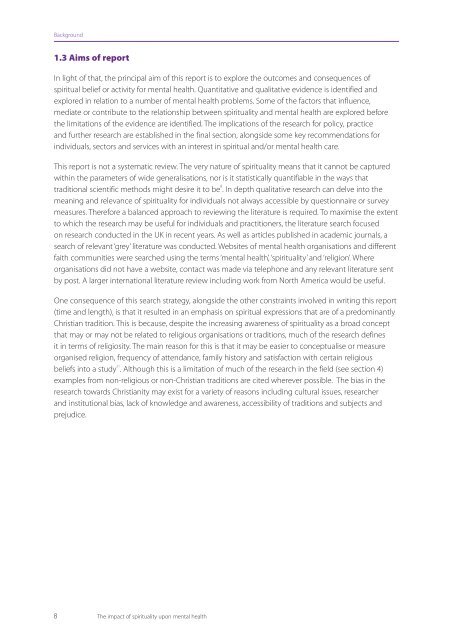The Gift of Spirituality
The Gift of Spirituality
The Gift of Spirituality
You also want an ePaper? Increase the reach of your titles
YUMPU automatically turns print PDFs into web optimized ePapers that Google loves.
Background<br />
1. Background<br />
1.1 Definitions <strong>of</strong> spirituality<br />
<strong>Spirituality</strong> is a word used in an abundance <strong>of</strong> contexts that means different things for different people<br />
at different times in different cultures. Although expressed through religions, art, nature and the built<br />
environment for centuries, recent expressions <strong>of</strong> spirituality have become more varied and diffuse. This<br />
is reflected in the range <strong>of</strong> vocabulary used to describe spirituality. Some <strong>of</strong> the more common themes<br />
in the literature describe it using one or more <strong>of</strong> the following elements:<br />
•<br />
•<br />
•<br />
•<br />
•<br />
•<br />
•<br />
a sense <strong>of</strong> purpose 1<br />
a sense <strong>of</strong> ‘connectedness’ – to self, others, nature, ‘God’ or Other 1<br />
a quest for wholeness 2<br />
a search for hope or harmony 3<br />
a belief in a higher being or beings 1<br />
some level <strong>of</strong> transcendence, or the sense that there is more to life than the material<br />
or practical 4 , and<br />
those activities that give meaning and value to people’s lives.<br />
Underlying many <strong>of</strong> those themes is an assumption that an intrinsic (<strong>of</strong>ten sub-conscious) human<br />
activity is one <strong>of</strong> trying to make sense <strong>of</strong> the world around us and <strong>of</strong> our meaning and place within it 5;6;7 .<br />
In this context, “spirituality” becomes the vehicle through which that meaning is sought, and can vary<br />
according to age, gender, culture, political ideology, physical or mental health and myriad other factors.<br />
For some, that vehicle is religion. <strong>The</strong> most recent Census (Office for National Statistics, 2001) states that<br />
the UK population includes approximately 42 million people who describe themselves (nominally or<br />
otherwise) as Christian, 1.5 million Muslims, over 500,000 Hindus, 340,000 Sikhs, over 250,000 Jews and<br />
a significant number <strong>of</strong> smaller religious communities. Within each <strong>of</strong> these groups, there is a vast range<br />
<strong>of</strong> traditions and practices through which spirituality is experienced or expressed. Much <strong>of</strong> the research<br />
on spirituality and mental health focuses on the observable and/or measurable elements <strong>of</strong> religious<br />
expression, such as attendance at church, temple, mosque or synagogue, or time spent in prayer/<br />
meditation. However, for others – including the 9 million UK citizens who say they don’t have a religion<br />
– spirituality takes many other forms.<br />
Swinton recognises that spirituality has broadened in meaning into “a more diffuse human need that<br />
can be met quite apart from institutionalised religious structures” 8 . He identifies it as the outward<br />
expression <strong>of</strong> the inner workings <strong>of</strong> the human spirit and his definition <strong>of</strong> spirituality is the one that will<br />
be used for the purposes <strong>of</strong> this report:<br />
6<br />
<strong>The</strong> impact <strong>of</strong> spirituality upon mental health

















